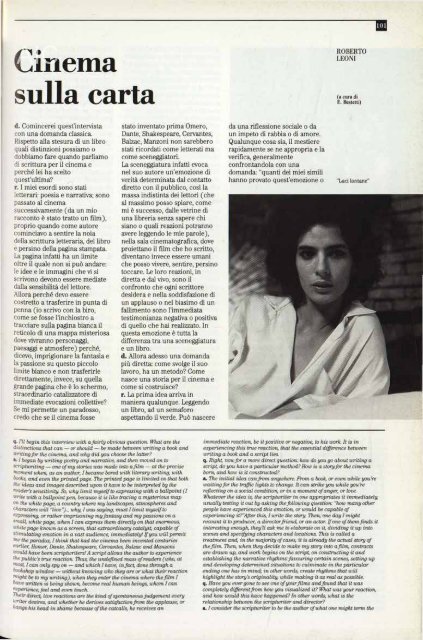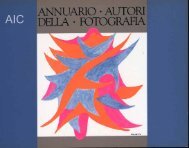ITALIANA - AIC Associazione Italiana Autori della Fotografia ...
ITALIANA - AIC Associazione Italiana Autori della Fotografia ...
ITALIANA - AIC Associazione Italiana Autori della Fotografia ...
Create successful ePaper yourself
Turn your PDF publications into a flip-book with our unique Google optimized e-Paper software.
<strong>AIC</strong><br />
Cinema<br />
sulla carta<br />
d. Comincerei quest'intervista<br />
con una domanda classica.<br />
Rispetto alla stesura di un libro<br />
quali distinzioni possiamo o<br />
dobbiamo fare quando parliamo<br />
di scrittura per il cinema e<br />
perché lei ha scelto<br />
quest'ultima?<br />
r. I miei esordi sono stati<br />
letterari: poesia e narrativa; sono<br />
passato al cinema<br />
successivamente (da un mio<br />
racconto è stato tratto un film),<br />
proprio quando come autore<br />
cominciavo a sentire la noia<br />
<strong>della</strong> scrittura letteraria, del libro<br />
e persino <strong>della</strong> pagina stampata.<br />
La pagina infatti ha un limite<br />
oltre il quale non si può andare:<br />
le idee e le immagini che vi si<br />
scrivono devono essere mediate<br />
dalla sensibilità del lettore.<br />
Allora perché devo essere<br />
costretto a trasferire in punta di<br />
penna (io scrivo con la biro,<br />
come se fosse l'inchiostro a<br />
tracciare sulla pagina bianca il<br />
reticolo di una mappa misteriosa<br />
dove vivranno personaggi,<br />
paesaggi e atmosfere) perché,<br />
dicevo, imprigionare la fantasia e<br />
la passione su questo piccolo<br />
limite bianco e non trasferirle<br />
direttamente, invece, su quella<br />
grande pagina che è lo schermo,<br />
straordinario catalizzatore di<br />
immediate evocazioni collettive?<br />
Se mi permette un paradosso,<br />
credo che se il cinema fosse<br />
stato inventato prima Omero,<br />
Dante, Shakespeare, Cervantes,<br />
Balzac, Manzoni non sarebbero<br />
stati ricordati come letterati ma<br />
come sceneggiatori.<br />
La sceneggiatura infatti evoca<br />
nel suo autore un'emozione di<br />
verità determinata dal contatto<br />
diretto con il pubblico, così la<br />
massa indistinta dei lettori (che<br />
al massimo posso spiare, come<br />
mi è successo, dalle vetrine di<br />
una libreria senza sapere chi<br />
siano o quali reazioni potranno<br />
avere leggendo le mie parole),<br />
nella sala cinematografica, dove<br />
proiettano il film che ho scritto,<br />
diventano invece essere umani<br />
che posso vivere, sentire, persino<br />
toccare. Le loro reazioni, in<br />
diretta e dal vivo, sono il<br />
confronto che ogni scrittore<br />
desidera e nella soddisfazione di<br />
un applauso o nel biasimo di un<br />
fallimento sono l'immediata<br />
testimonianza negativa o positiva<br />
di quello che hai realizzato. In<br />
questa emozione è tutta la<br />
differenza tra una sceneggiatura<br />
e un libro.<br />
d. Allora adesso una domanda<br />
più diretta: come svolge il suo<br />
lavoro, ha un metodo? Come<br />
nasce una storia per il cinema e<br />
come si costruisce?<br />
r. La prima idea arriva in<br />
maniera qualunque. Leggendo<br />
un libro, ad un semaforo<br />
aspettando il verde. Può nascere<br />
q. I'll begin this interview with a fairly obvious question. What are the<br />
distinctions that can — or should — be made between writing a book and<br />
writing for the cinema, and why did you choose the latter?<br />
I began by writing poetry and narrative, and then moved on to<br />
scriptwriting — one of my stories was made into a film — at the precise<br />
moment when, as an author, I became bored with literary writing, with<br />
books, and even the printed page. The printed page is limited in that both<br />
the ideas and images described upon it have to be interpreted by the<br />
reader's sensitivity. So, why limit myself to expressing with a ballpoint (I<br />
write with a ballpoint pen, because it is like tracing a mysterious map<br />
on the white page, a country where my landscapes, atmospheres and<br />
characters will "live")... why, I was saying, must I limit myself to<br />
expressing, or rather imprisoning my fantasy and my passions on a<br />
small, white page, when I can express them directly on that enormous,<br />
white page known as a screen, that extraordinary catalyst, capable of<br />
stimulating emotion in a vast audience, immediately! If you will permit<br />
me the paradox, I think that had the cinema been invented centuries<br />
earlier, Homer, Dante, Shakespeare, Cervantes, Balzac and Manzoni<br />
would have been scriptwriters! A script allows the author to experience<br />
the public's true reaction Thus, the undefined mass of readers (who, at<br />
most, I can only spy on — and which I have, in fact, done through a<br />
bookshop window — without knowing who they are or what their reaction<br />
might be to my writing), when they enter the cinema where the film I<br />
have written is being shown, become real human beings, whom I can<br />
experience, feel and even touch<br />
Their direct, live reactions are the kind of spontaneous judgement every<br />
writer desires, and whether he derives satisfaction from the applause, or<br />
hangs his head in shame because of the catcalls, he receives an<br />
ROBERTO<br />
LEONI<br />
(a cura di<br />
E. Bestetti)<br />
da una riflessione sociale o da<br />
un impeto di rabbia o di amore.<br />
Qualunque cosa sia, il mestiere<br />
rapidamente se ne appropria e la<br />
verifica, generalmente<br />
confrontandola con una<br />
domanda: "quanti dei miei simili<br />
hanno provato quest'emozione o "Luci lontane"<br />
immediate reaction, be it positive or negative, to his work. It is in<br />
experiencing this true reaction, that the essential difference between<br />
writing a book and a script lies.<br />
q. Right, now for a more direct question: how do you go about writing a<br />
script, do you have a particular method? How is a story for the cinema<br />
born, and how is it constructed?<br />
a. The initial idea can from anywhere. From a book, or even while you're<br />
waiting for the traffic lights to change. It can strike you while you're<br />
reflecting on a social condition, or in a moment of anger, or love.<br />
Whatever the idea is, the scriptwriter in one appropriates it immediately,<br />
usually testing it out by asking the following question: "how many other<br />
people have experienced this emotion, or would be capable of<br />
experiencing it?"After this, I write the story. Then, one day I might<br />
recount it to producer, a director friend, or an actor. If one of them finds it<br />
interesting enough, they'll ask me to elaborate on it, dividing it up into<br />
scenes and specifying characters and locations. This is called a<br />
treatment and, in the majority of cases, it is already the actual story of<br />
the film. Then, when they decide to make my story into a film, contracts<br />
are drawn up, and work begins on the script, on constructing it and<br />
establishing the narrative rhythms: favouring certain scenes, setting up<br />
and developing determined situations to culminate in the particular<br />
ending one has in mind,' in other words, create rhythms that will<br />
highlight the story's originality, while making it as real as possible.<br />
q. Have you ever gone to see one of your films and found that it was<br />
completely different from how you visualized it? What was your reaction,<br />
and how would this have happened? In other words, what is the<br />
relationship between the scriptwriter and director?<br />
a. I consider the scriptwriter to be the author of what one might term the









